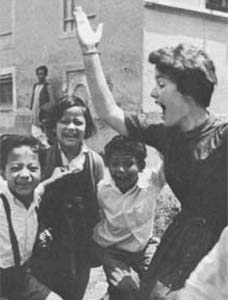
Congo Kinshasa RPCV Christopher D. Pilcher develops test that can show the presence of HIV within hours of infection
2005 HIV study could help save money and lives
UNC researchers use batch testing to detect virus hours, days after infection
By Jim Shamp
The Herald-Sun
Durham, N.C.
May 5, 2005
Batch testing of blood samples and use of an extra $4 analysis for routine HIV testing could save millions of dollars and prevent thousands of HIV and AIDS cases, according to a study by UNC and state health experts.
The study, published in today's New England Journal of Medicine, demonstrated to AIDS researchers the effectiveness of the expanded process in a yearlong experiment testing 109,250 North Carolina residents at risk for HIV.
HIV infection can be better contained if it's diagnosed quickly. It's more contagious during the hours and days right after infection. But standard tests can't detect the virus for one to two months. It takes that long after people are infected with HIV for their immune systems to produce detectable antibodies.
A more sensitive test, called nucleic acid amplification, doesn't target antibodies. Instead, it can show the presence of HIV within hours of infection.
But it also adds costs to an already overburdened public health system. And it tends to give false positive readings, meaning more testing is needed to confirm infection, according to Christopher Pilcher, assistant professor of medicine at the UNC School of Medicine and lead author of the research study.
The North Carolina researchers decided to evaluate the costs and benefits of routinely using nucleic acid amplification in a process similar to the HIV screening process that protects the nation's blood supply -- testing blood samples in groups rather than individually.
Test volunteers were seen at 110 state-funded clinics between November 2002 and October 2003. Technicians first tested volunteers' individual blood samples using the standard antibody test. Those testing positive for HIV were separated out, and donors of those samples were given followup consulting and support.
The remaining volunteers' blood samples were combined in batches of 90 and tested by nucleic acid amplification to search for people who might be too recently infected for detection by the antibody test.
If no HIV turned up this time, it meant one quick test cleared all 90. But if a batch tested positive, technicians still were able to continue the approach, sampling nine batches of 10 specimens each. If no HIV were found in a grouping of 10 specimens, all people in that group were deemed HIV negative. If a batch of 10 tested positive, technicians then screened each volunteer's blood sample in that batch to find whoever was infected.
The study was led by Pilcher and co-author Peter Leone, associate professor of medicine at UNC who also serves as medical director of the N.C. HIV/STD Prevention and Care Branch in Raleigh and as an adjunct associate professor of epidemiology in the UNC School of Public Health.
Of the people tested, 583 were found to be HIV-positive using the antibody tests alone. An additional 23 cases of HIV infection were found with the nucleic acid amplification.
Pilcher said that in North Carolina about one acute case is missed in every 5,000 antibody tests -- false negatives that actually do have HIV infections.
"That differs from place to place," he said. "An STD clinic in San Francisco, for example, is likely to have many times the prevalence rate of acute HIV compared to what we find in general in North Carolina. And in some African countries such as Malawi, it's more like 1 in 50 false negatives that actually turn out to be positive in later testing."
North Carolina's experiment in the broad-based, pooled testing also included an aggressive followup program with people newly detected with HIV infection. The goal was to help them avoid infecting others through shared needles or unprotected sexual contact.
Because of the effectiveness of the expanded screening program, this year's state public health budget reflects an extra $3.63 for each HIV test, the researchers said. That's a total of about $450,000 -- about $17,000 to find each new "index" case of HIV infection.
An index case is an original person found positive for HIV infection through the testing -- not that person's intimate contacts subsequently found by caseworkers also to be infected.
"Finding these cases early can let us start treatment well before HIV converts to AIDS," Pilcher said. "And that doesn't say anything about the cases averted. So there are many, many ways that diagnosing people early and counseling them is likely to be cost effective."
Pilcher said he sees potential to use the advanced screening techniques in this study for developing HIV vaccines.
"This allows us to look at the virus just after it makes the jump from one person to another -- one area in which HIV research has been severely handicapped heretofore," he said. "That, to me, is another exciting thing about this. And the most exciting thing is not just the lives that we've affected so far in North Carolina, but it's the global potential for this approach, and the unlimited opportunities for HIV prevention and care."
INFORMED SOURCE
WHO: Christopher Pilcher, assistant professor of medicine at the UNC School of Medicine.
EXPERTISE: Pilcher, 40, a native of Burlington, Vt., received a B.S. in biology from Harvard in 1986, then earned an M.D. from the University of Vermont College of Medicine in 1993. He then did three years of service with the Peace Corps in Zaire before coming to Durham for a residency in internal medicine and pediatrics at the Duke University Medical Center. He then did a fellowship at UNC, where he remains on the faculty. Pilcher lives in Carrboro with his wife, Barbara Laraia, an assistant professor of nutrition at the UNC School of Public Health, and their son, Joshua, 5. Pilcher's hobbies include sailing and enjoying Carrboro.









